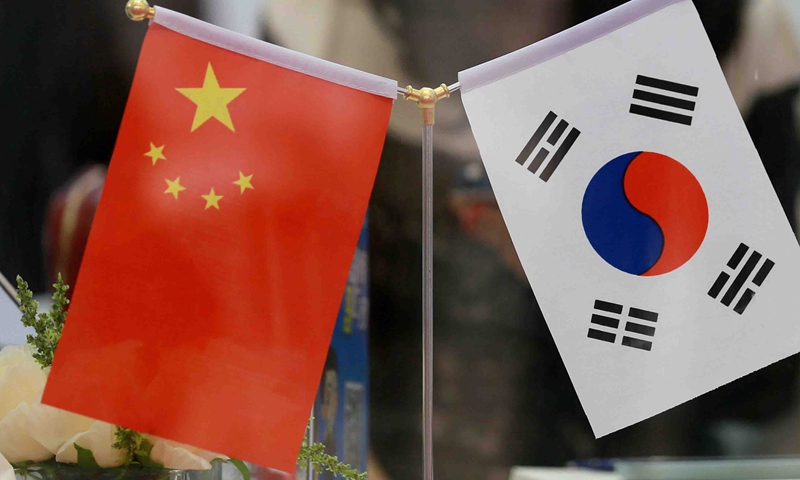China-S.Korea relationship mutually beneficial, not zero-sum game like in Squid Game: Chinese Ambassador

China South Korea File photo:CGTN
The relationship between China and South Korea has never been a zero-sum, winner-takes-all game like in Squid Game, but a neighborhood that helps each other and shares weal and woe like in Reply 1988, Chinese Ambassador to South Korea Xing Haiming said, calling on the two countries to push for more mature and stable bilateral ties as this year marks the 30th anniversary of China-South Korea diplomatic relations.
The two South Korean TV series that the ambassador mentioned are popular in China. Reply 1988, which was released in 2015 and depicts a warm relationship in a neighborhood, is timeless for many Chinese fans.
China and South Korea are a community with a shared future that stands together through thick and thin, said the ambassador, according to the press release on Monday on the embassy's website.
We firmly believe that under the strategic guidance of the two heads of state and the full cooperation of the two governments, China-South Korea relations will surely move to a higher stage of development, Xing said.
With the in-depth development of bilateral relations, issues such as THAAD and sour public sentiment have emerged in bilateral relations. The two sides also have different views on some issues, which is normal and can be overcome with joint efforts, Xing believes.
In the face of complex changes in the world and the growing risks of a "new Cold War," it is important for the two neighbors to maintain strategic independence, resolutely reject the Cold War mentality and oppose confrontation, Xing said.
It is hoped that South Korea will continue to firmly adhere to the one-China principle, which is the political foundation of the bilateral relations. China has major concerns on issues related to Taiwan, Hong Kong, Xizang, Xinjiang and the South China Sea and hopes that the South Korea will continue to pay attention to them.
In addition, the bilateral relations were once at a low ebb due to the THAAD issue, which has become a "sensitive word" in the bilateral relations, and the two sides should never repeat the mistake. Although the two sides have made joint efforts to get back on track, they still haven't completely recovered from the shadow. China is ready to deepen strategic communication with the South Korea on the basis of mutual respect for each other's core interests and major concerns, enhance mutual understanding and lay a solid foundation for bilateral relations in the next three decades.
Xing called on the two countries to comply with the economic law and constantly improve their bilateral economic and trade cooperation, rather than sabotage the existing industrial and supply chains as some countries do. "This is clearly against the economic law, let alone the common interests of China and South Korea."
On the Korean Peninsula issue, China is committed to realizing denuclearization, safeguarding peace and stability of the peninsula and resolving the issue through dialogue and consultation. The early resumption of the dialogue process between North Korea and the US is the key to resolving the issue. China calls on the US to take concrete actions to respond to North Korea's security concerns and create conditions for the two sides to build mutual trust.
In addition, both Chinese and South Korean cultures have the same roots and are regarded as representatives of Oriental culture. Some Westerners find it difficult to tell the difference between Chinese and South Koreans because we are very similar in appearance and culture. It is regrettable that some netizens of the two countries have had unnecessary disputes over historical and cultural issues. While respecting the differences and uniqueness of the two cultures, we should also recognize the similarities and commonness of the two cultures, which is a natural favorable condition for developing the bilateral relations and promoting closer people-to-people ties, Xing pointed out.
Since the establishment of diplomatic ties, China-South Korea relations have witnessed rapid development in political, economic, cultural and other fields and yielded fruitful results, which have benefited the two countries. In the new era, bilateral relations are full of vigor and vitality, Xing pointed out.
The frequent exchanges between China and South Korea at all levels and active exchanges between governments, parliaments and political parties have laid a solid foundation of political mutual trust for the development of bilateral relations. This trend has not been affected by the rotation of South Korean political parties in power, said Xing.
The two countries' trade volume has expanded by nearly 60 times from more than $5 billion in the early days of our diplomatic ties. According to a study by a South Korea institution, the correlation between the economic development of the two countries since 2008 was 0.56, while that of the South Korea and the US was 0.054 during the same period. Last year, trade between China and the South Korea bucked the trend and exceeded $360 billion, setting a new record and demonstrating the huge potential of bilateral economic and trade cooperation, according to Xing.
As the Regional Comprehensive Economic Partnership has entered into force in China, South Korea and other countries and regions, bilateral economic and trade cooperation will enjoy greater space for development, Xing said.
Global Times


